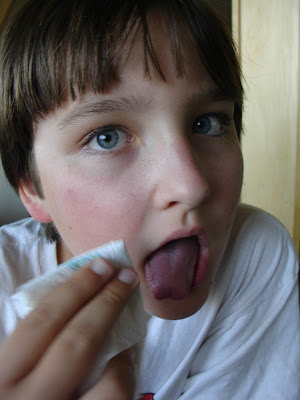Well, at least a few of them - but a few is better than none! Today, CJ and Annabelle strained to reach some growing on a steep hillside by the ballfield at Bayview Park.
Later tonight, the tastebuds were put to use again as we completed an assignment for our "Science of Gastronomy" course.
Tonight professor King spoke volumes about how we taste and what we taste (yes, including umami). We learned lots about the types and locations of taste of receptors in our body. The professor also covered the topic of "supertasters." CJ reminded us that at the Seattle Science Expo a month or so ago, there was a booth there with a banner that asked, "Are you a supertaster?" We were each given strips to taste. Annabelle and Christian tasted nothing but the paper of the strip, while CJ and I winced at its bitterness. Turns out we're supertasters (along with about 25 percent of the population, and more women than men are supertasters). It's a genetic. thought to be related to the presence of the TAS2R38 gene, specifically.
We also learned lots about saliva - how it's made and what its functions (as transportation, a solvent, protection, and more) are. And we learned why you should wash capsaicin-laced foods down with full fat milk (it's soluble in lipids) instead of beer (alcohol can make it seem hotter!).
Our assignment tonight was to dry all the saliva off our tongues and then try to taste salt or sugar. Surprise, surprise, it had a nearly imperceptible taste. Then, we repeated the taste with a 'normal' (not dry) mouth and, of course, we could taste the sugar or salt, no problem. Well done, saliva, well done.
BUDDING ARTIST: Annabelle spends a fair amount of time most every day drawing. Often it's crayon or pencil on paper, often it's with graphic software. I've been super impressed with her (self taught) progress as of late. For instance, here is a progression of a baby shark she drew and then colored.
And here's a turtle.
MATHS: This week I started an online class from Stanford called "How to Learn Math." So far, it's absolutely riveting. Professor Jo Boaler has made a career out of studying math teaching and discerning why math evokes such strong negative feelings for so many. There's a nice overview article about the class here: https://ed.stanford.edu/news/new-online-course-learning-love-math. I'm one of 20,000+ parents/teachers enrolled.
Boaler's class seems very necessary when you start reading about students experiences in and perceptions about math education. For example, one survey of adults found that four out of 10 hated math in school, twice as many as any other subject. Yowza.
I'd highly recommend anyone who is in a position to teach or help anyone in math to check it out. The lectures are anything but the standard dry sermons. They are sprinkled with interviews with students and other math experts, and along the way there are short, relevant assignments. The ones so far are largely based on the course taker's observations and experiences - in other words, there's no long hard math quiz or final to worry about! ;)
One of our assignments asked us to make a concept map of themes we heard emerging from interviews with students about their feelings toward math. Here's what I came up with.
This fall, Boaler will be offering a version of the course for kids ages 10-ish in the upcoming school year. I know a couple of students who will be enrolled!










Kids learn that "fractions are hard" or "decimals are hard" from older kids who learned it from older kids who ...
ReplyDeleteHitting a pitched baseball is hard. Like anything else, some are better at it than others but everyone can do it.
Many kids also learn math is hard from their teachers, or from their parents, or from stereotypes and messages in the media, or even from toys ... http://www.youtube.com/watch?v=NO0cvqT1tAE
DeleteSo, how do we break the cycle?
DeleteWe take Dr. Boaler's class. :) It's really terrific. She also has a couple of books: "What's Math Got to do With It?: How Parents and Teachers Can Help Students Love Their Least Favorite Subject" and "The Elephant in the Classroom: Helping Children Learn and Love Maths"
Delete